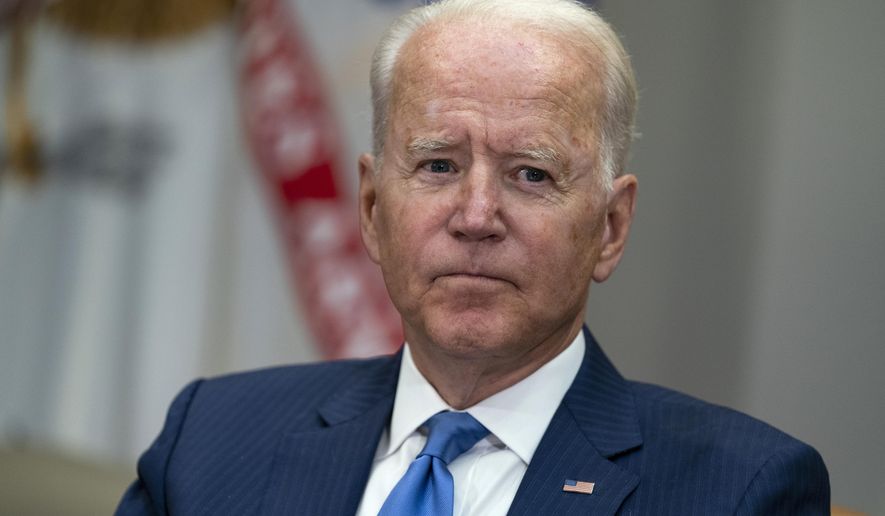The nation’s major internet companies are pushing back at President Biden’s plan for more city and local governments to offer broadband, sparking fears of government-run Internet service.
The plan, which the White House wants in the bipartisan package of traditional infrastructure spending, would encourage more local governments and nonprofits groups such as farmers’ co-ops to offer broadband as a utility. If successful, it would increase competition in the internet service market and potentially drive down prices, which are higher in the U.S. than in Europe or Asia.
Companies such as AT&T and Comcast that currently have a near-monopoly in many places would be forced to lower prices, according to the plan’s proponents.
But as congressional negotiators try to work out the details of a $1.2 trillion bipartisan framework for the infrastructure bill, the broadband industry and some Republicans warn it will usher in a government takeover of internet service.
Some Republicans also object to Mr. Biden’s push for the federal government to override laws passed by 20 states that bar local governments from providing broadband service.
“The policies proposed by Democrats and the Biden administration prioritize inefficient, government-run networks,” a Republican aide said. “Our priorities are broadband provisions that improve broadband services for more Americans (and) unleash rather than restrict innovation.”
The debate underscores how a slew of contentious policy issues still needs to be resolved to advance the bipartisan proposal.
With its focus on traditional infrastructure projects such as roads, bridges and broadband, the package is considered less contentious than the multitrillion-dollar “human infrastructure” bill Democrats want to unilaterally push through Congress.
Taking a more bipartisan path, Mr. Biden and congressional leaders from both parties have agreed on the $1.2 trillion size of the bill, which includes $65 billion in new spending for broadband.
But Democrats and Republicans are still negotiating exactly what the money will be spent on, including thorny questions about undoing state laws and prioritizing the broadband funds to go to nonprofits.
“It’s very critical to make sure we get the details of this right because [the infrastructure package] could be something that simply preserves the status quo. It could entrench monopolies instead of bringing in new technologies and new competition. It could raise prices instead of lowering prices and bringing affordability and equity,” said former GOP Rep. Chip Pickering, who is now the chief executive officer of INCOMPAS, an industry group that represents smaller internet and phone companies, as well as companies like Twitter and Facebook.
Mr. Pickering’s group is advocating increasing competition to lower prices but prefers offering federal dollars to private companies to enter markets.
Several studies indicate that cost is a factor in why some people do not have broadband at home.
A 2020 study by the New America Foundation’s Open Technology Institute found that the average advertised price of broadband service in the U.S. was $84.37, compared to $64.29 in Europe and $62.41 in Asia. The higher prices bought faster speeds in the U.S. than in Europe, but U.S. service was costlier and slower than in Asia.
A Pew Research survey in June found that only 57% of adults with household incomes below $30,000 had broadband at home compared to 93% of those who make more than $100,000.
Mr. Pickering said there was bipartisan support for the $50-a-month broadband subsidies Congress created for low-income families that Congress approved last year as part of a $900 billion coronavirus relief package. But there’s less agreement on making the subsidy permanent.
In his American Jobs Act, Mr. Biden proposed making the subsidy permanent but also said broadband prices have to come down. While that set off fears of rate regulation, the president has focused on trying to lower rates through competition.
According to recent Federal Communications Commission data, 84% of Americans willing to buy the slowest internet had a choice of at least two providers at the end of 2019. But for those wanting the fastest speeds, 64% either could not get it or had only one company offering the service.
“As Congress considers providing more funding for broadband build out, they should ensure that all options are on the table, including preempting state laws that ban communities from establishing municipal networks so they can take control of their own destiny to obtain this essential service,” said Greg Guice, government affairs director for Public Knowledge, a left-leaning tech advocacy group.
The idea has some Republican support. A bill co-sponsored by Sen. Rob Portman, Ohio Republican, Sen. Michael Bennet, Colorado Democrat, and Sen. Angus King, a Maine independent who votes with Democrats, would undo state laws barring government-run internet, particularly to provide service in rural areas that are unprofitable for companies to serve.
Arkansas Gov. Asa Hutchinson, a Republican, signed a bill in April that lifted the ban imposed in 2013.
However, Michael Powell, chief executive officer of NCTA, an association of internet and TV companies, said the government should stay out of providing broadband service and leave it to private companies. Sending the infrastructure dollars to cities, particularly those that are already served by at least one company, takes money away from bringing broadband to areas that do not have it at all.
“The privately funded broadband industry has achieved spectacular results over the last decade and most notably met the enormous challenge of the pandemic, keeping Americans working from home, learning remotely, and using telehealth to stay safe,” said Mr. Powell, a former chairman of the FCC under President George W. Bush.
• Kery Murakami can be reached at kmurakami@washingtontimes.com.




Please read our comment policy before commenting.